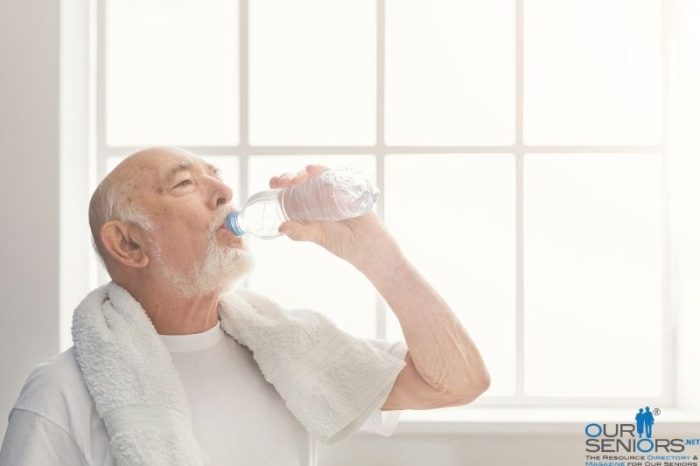When it comes to proper hydration in people, most believe that we should be concerned with the summer months when temperatures can spike to over 100 degrees. The risks of dehydration are particularly high for infants and seniors. Each year there are warnings from several resources encouraging people to stay hydrated during the summer to avoid some serious health problems. Unfortunately, many people aren’t aware that the fall months of September, October and November, when temperatures can still reach the upper 80s, can be just as dangerous for anyone that does not maintain proper hydration. This is especially true for seniors.
As we age, our bodies’ ability to retain fluid decreases. Our bodies require more fluid intake to function properly but the ability to conserve water is greatly reduced. Many seniors also experience a lessened ability to sense thirst, which means we need to be more aware of the amount of water we intake each day.
Health Risks Caused by Dehydration
There can be a lot of confusion surrounding recommendations for the health and well-being of seniors as we transition out of the pandemic. And all the information people receive can be overwhelming and sometimes contradictory when the information comes from unreliable sources. Whether you are fully or partially vaccinated, hydration is an important issue that needs to be addressed to keep you healthy.
Some of the health risks that can be caused by dehydration are:
- Coma
- Heat Cramps
- Heat Exhaustion
- Heatstroke
- Kidney Failure
- Low Blood Volume
- Seizures
If one does not adequately stay hydrated, they are putting themselves at risk of any of the conditions listed above, some of which can cause or worsen other health conditions or be fatal. If you are suffering from a cold, constipation, cough, diarrhea, dizziness, or are experiencing any other flu-like symptoms, you need to make sure you take extra care of yourself by hydrating more so than you would on a regular day to ensure you don’t worsen any of these conditions.
Common Signs of Dehydration
All the health conditions listed above can not only put you at greater risk of becoming dehydrated but can also be signs that you are already dehydrated. There are other common signs you should always look out for, including:
- Confusion (Not able to focus on things or forgetting things easily)
- Dark-colored urine (Darker than what should be normal according to your current health)
- Dry or sticky mouth (Not having enough saliva or causing saliva to become thick or stringy)
- Feeling dizzy or lightheaded (Trouble walking or standing with a need to sit or lay down)
- Feeling unquenchable thirst (Sudden need to drink a lot of liquids without feeling satisfied)
- Few or no tears (Lack of lubrication, redness, irritation, or discomfort when blinking)
- Not urinating frequently (Dark-colored urine and only urinating 1 – 2 times a day)
- Unexplained tiredness (Malaise, muscle fatigue, or soreness with general lack of energy)
Each of the symptoms above can be caused by various factors (from diets to medication), but you can usually always remedy common signs of dehydration by simply drinking more fluids without the need to seek medical attention. If the symptoms persist, call your doctor to ensure there are no underlying problems you should be aware of to prevent further complications.
Serious Signs of Dehydration
The following signs of dehydration are much more serious and usually come after you have experienced one or more of the symptoms listed above. If you experience any of the following, call your doctor immediately:
- Bloody or black stool without reason (e.g., dietary)
- Diarrhea or vomiting that lasts more than a day
- Feelings of irritability or disorientation
- Inability to keep fluids down (i.e., vomiting liquids)
- Feelings of sleepiness without reason
How to Stay Hydrated in the Fall Months
The easiest thing you can do to stay hydrated in the fall months is to drink plenty of fluids. Water is the best option because it has no sugar and can adequately help and restore normal bodily functions. You can also incorporate foods that are high in water content, such as fruits and vegetables. Let your body be your guide. Many times, people will think they are hungry when their bodies are telling them that they are thirsty and need to be adequately replenished for optimal health.
People should also avoid excessive or strenuous exercise when the weather reaches higher temperatures or humidity levels are high. We are encouraged to remain active but need to understand that there are periods throughout the year when it is better to be safe by remaining in cool places (e.g., indoors or in shaded areas) to lower body temperature and to avoid losing water through sweat.

